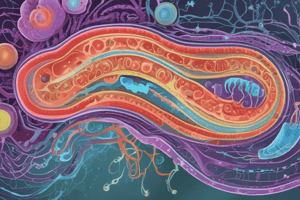Podcast
Questions and Answers
What is microbiology the study of?
What is microbiology the study of?
99% of microorganisms contribute to the quality of human life.
99% of microorganisms contribute to the quality of human life.
What is the largest majority of microorganisms associated with?
What is the largest majority of microorganisms associated with?
Viruses are considered living organisms when they are outside the cell.
Viruses are considered living organisms when they are outside the cell.
The scientific term for what most people refer to as 'germs' is _____ .
The scientific term for what most people refer to as 'germs' is _____ .
Who warned against locating a homestead near swamps?
Who warned against locating a homestead near swamps?
Who proposed the 'Spontaneous Generation Theory'?
Who proposed the 'Spontaneous Generation Theory'?
What do microorganisms help break down?
What do microorganisms help break down?
Which of the following is NOT a branch of microbiology?
Which of the following is NOT a branch of microbiology?
Study Notes
Introduction to Microbiology
- Microbiology studies microorganisms, which include unicellular and multicellular microscopic entities.
- Diverse groups: eukaryotic cells (fungi, parasites, protists), prokaryotes (bacteria), and viruses.
- Focuses on host-microorganism interactions, including pathogenesis mechanisms and host immune responses.
Detrimental Effects of Microorganisms
- Microorganisms can overwhelm the human immune system through sheer numbers.
- Opportunistic infections occur when non-pathogenic organisms are introduced into sterile environments, such as cavities without normal flora.
- Presence of one organism in cerebrospinal fluid (CSF) is always considered harmful.
- Microorganisms produce potent toxins that disrupt bodily functions.
- Viruses replicate within tissue cells, leading to degeneration of those tissues.
History Milestones in Microbiology
- Ancient concepts include Jainism's notion of unseen microbiological life, proposed in the 6th century.
- Jain philosophy described "nigodas," submicroscopic creatures omnipresent in nature.
- Marcus Terentius Varro warned against settling near swamps due to minute unseen creatures that could cause diseases.
- Girolamo Fracastoro, in 1546, theorized that epidemic diseases were caused by transferable seeds that can spread infections.
- Aristotle (384-322 BC) proposed the Spontaneous Generation Theory, suggesting that life can arise from non-living material.
Germs and Their Impact
- "Germs" refer to microorganisms; medical microbiology focuses on pathogens.
- Most microorganisms (99%) are non-pathogenic and contribute positively to human life.
- Beneficial contributions include maintaining environmental chemical balance, forming the basis of food chains, and decomposing organic matter.
- Microorganisms help to inhibit the growth of pathogenic bacteria, providing a vital role in human health.
Studying That Suits You
Use AI to generate personalized quizzes and flashcards to suit your learning preferences.
Related Documents
Description
Explore the harmful impacts of microorganisms on human health in this quiz based on introductory microbiology. Understand how these microorganisms can overwhelm the human system and lead to opportunistic infections. This quiz will test your knowledge on the essential concepts and threats posed by these microscopic entities.




